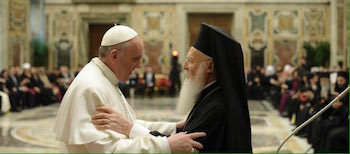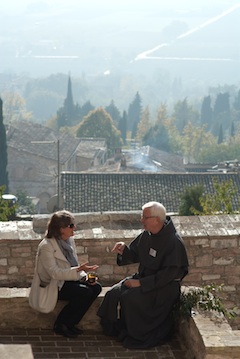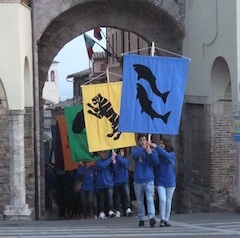Major Catholic church funds to make record divestment from fossil fuels
October 3, 2017:
 |
 |
 |
The Pope and the Patriarch made a joint statement for Creationtide this year. |
As more than 40 Catholic institutions pledge to make largest ever faith-based divestment, on the anniversary of the death of St Francis of Assisi, ARC prepares for a landmark meeting in Zug, where representatives from significant religious funds will discuss where they CAN put their investment wealth to make a better planet.
Lasalle Haus Zug meeting on Faith-Consistent Investing
Guardian article on Catholic Divestment
 |
| “I hope we will see more leaders like these 40 Catholic institutions commit, because while this decision makes smart financial sense, acting collectively to deliver a better future for everybody is also our moral imperative,” - Christiana Figueres |
|
 |
 |
The first Sacred Cities Investment meeting
Joint statement for Creationtide by Pope and Patriarch
Global Catholic Climate Movement
The Guardian article on the October 2017 divestmentThe Guardian newspaper has been a very serious campaigner for divestment in fossil fuels. Their correspondent Arthur Neslen wrote this article in today's paper.
 |
 |
 |
In a symbolically charged move, the Italian town of Assisi will also shed all oil, coal and gas holdings the day before a visit by the Italian prime minister, Paolo Gentiloni, to mark St Francis’s feast day. |
More than 40 Catholic institutions are to announce the largest ever faith-based divestment from fossil fuels, on the anniversary of the death of St Francis of Assisi.
The sum involved has not been disclosed but the volume of divesting groups is four times higher than a previous church record, and adds to a global divestment movement, led by investors worth $5.5tn.
Christiana Figueres, the former UN climate chief who helped negotiate the Paris climate agreement, hailed Tuesday’s move as “a further sign we are on the way to achieving our collective mission”.
She said: “I hope we will see more leaders like these 40 Catholic institutions commit, because while this decision makes smart financial sense, acting collectively to deliver a better future for everybody is also our moral imperative.”
Church institutions joining the action include the Archdiocese of Cape Town, the Episcopal Conference of Belgium and the diocese of Assisi-Nocera Umbra-Gualdo Tadino, the spiritual home of the world’s Franciscan brothers.
A spokesman for the €4.5bn German Church bank and Catholic relief organisation Caritas said that it was committing to divest from coal, tar sands and shale oil.
 |
 |
 |
Assisi’s mayor, Stefania Proietti – a former climate mitigation professor – told the Guardian: “When we pay attention to the environment, we pay attention to poor people, who are the first victims of climate change. |
In a symbolically charged move, the Italian town of Assisi will also shed all oil, coal and gas holdings the day before a visit by the Italian prime minister, Paolo Gentiloni, to mark St Francis’s feast day.
Assisi’s mayor, Stefania Proietti – a former climate mitigation professor – told the Guardian: “When we pay attention to the environment, we pay attention to poor people, who are the first victims of climate change.
“When we invest in fossil fuels, we stray very far from social justice. But when we disinvest and invest in renewable and energy efficiency instead, we can mitigate climate change, create a sustainable new economic deal and, most importantly, help the poor.”
The origins of the latest church action lie in last year’s climate encyclical by Pope Francis – himself named after St Francis of Assisi – although the project was advanced by the Global Catholic Climate Movement./ends
Initiative on Faith-Consistent Investing
Lasalle Haus Zug meeting on Faith-Consistent Investing
Link to Podcast on religions and climate changeThe Guardian The biggest story in the world podcast: Episode 9, Religion
In this episode we go to churches and mosques to see what we can learn about spreading the climate change message. Listen here.
|

